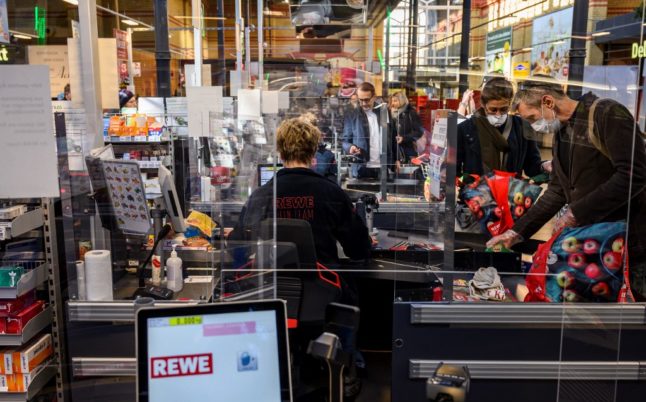The checkout is designed for people who aren’t in a hurry and might like a bit of chat, German newspaper Bild am Sonntag reported.
‘Ratschen‘ is Bavarian for having a chat or a chinwag and that’s exactly what people in one Edeka supermarket in Memmingen in Bavaria are invited to do at the dedicated checkout.
The slower till is open Mondays to Thursdays from 9am – 11am.
READ ALSO: German Edeka store legitimises ‘dumpster-diving’ to reduce food waste
The 12-week initiative was prompted by the pandemic, which led to people feeling increasingly isolated, with some still suffering the after-effects of this.
According to one EU study, reported loneliness levels jumped to 25 percent during the pandemic, from 12 percent previously.
This is where the Ratschkasse comes in, making it easy for lonely people to have access to more contact with others.
This is especially important given the link between loneliness and poor health: loneliness increases the risk of depression, high blood pressure, stroke, diabetes and dementia.
The supermarket’s owner, Ilka Abröll-Groiß, started the project with the Bavarian Minister for Health Klaus Holetschek (CSU).
“It’s the opposite to those self-scan checkouts that we think are really awful,” she said.
Of course the initiative isn’t for everyone, but for others, especially some elderly people, it can be a lifeline.
Going to the supermarket may be the only time they see or speak to other people.
And the Edeka supermarket isn’t the only shop fighting loneliness like this.
Another supermarket in Schweinfurt in Bavaria has been running a similar initiative – dubbed ‘Plauderkasse‘ (a till for chatting) for a couple of months now.
“The response has been fantastic,” owner Marius Hoechner told German regional newspaper the Merkur, adding that he wanted to make this a long-term initiative.
The checkout is open on one day for four hours, sometimes more.
And Germany isn’t alone in exploring such initiatives.
READ ALSO: The complete German supermarket survival guide (Video)
In Basel, Switzerland, for example, a supermarket and a chemist introduced ‘checkouts for chatting’ as part of a health initiative in autumn 2022.
The project was only intended to last six months, but the tills were so in demand, the project was extended.
Slowing down the checkout process may not seem a logical way for shops to make money, but it certainly seems to make sense, so maybe we will see more of these checkouts opening in the future.




 Please whitelist us to continue reading.
Please whitelist us to continue reading.
I used to work for a big airline in the US as a customer service agent. They permitted we spend 10 minutes on the phone with an elderly or other person who just really wanted to chat before letting them go to handle other callers. You knew right away they weren’t flying anywhere, just really wanted so human contact. Sad. Made me love my work and employer more though.